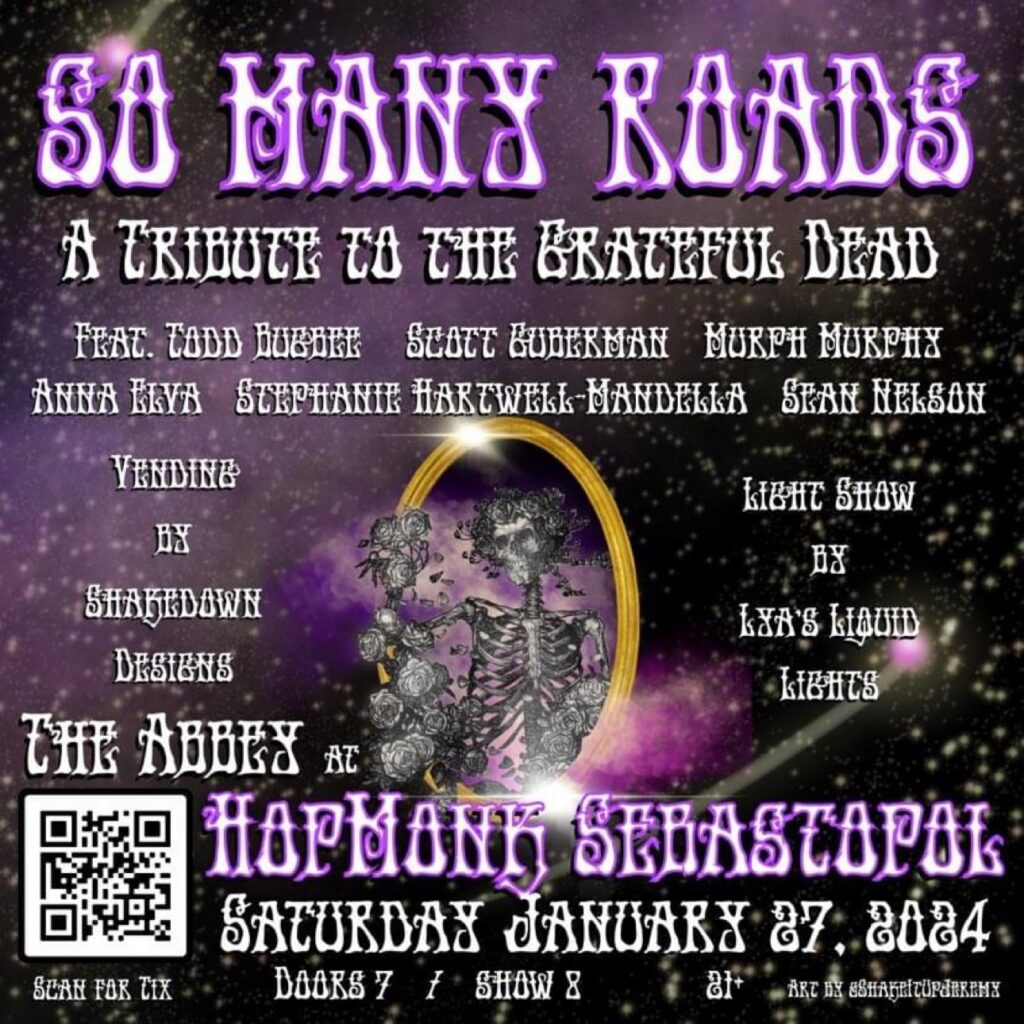Bob Weir performed at Sundance Film Festival 1.23.2011 in Park City, Utah
as part of the premiere of the film The Music Never Stopped. Mickey Hart joined Bob during his set.
Bob’s Set at the ASCAP Cafe: The Music Never Stopped, Me and My Uncle, Desolation Row, K.C. Moan, Victim or the Crime, Easy to Slip, Loose Lucy, Jack Straw, Corrina* > Truckin’ > The Other One > Sugar Magnolia > Not Fade Away
(*Mickey joined in on percussion for rest of set)
The Music Never Stopped
Based upon “The Last Hippie” by Oliver Sacks, M.D.
http://themusicneverstopped-movie.com
Directed by Jim Kohlberg
Written by Gwyn Lurie and Gary Marks
Produced by Julie W. Noll, Jim Kohlberg, Peter Newman, Greg Johnson
Starring:
J.K. Simmons
Lou Taylor Pucci
Cara Seymour
Julia Ormond
“The Music Never Stopped,” based on the case study “The Last Hippie” by Dr. Oliver Sacks, M.D. (“Awakenings”), chronicles the journey of a father and son adjusting to cerebral trauma and a lifetime of missed opportunities. Through the music that embodied the generation gap of the 1960s, the film weaves the heartwarming progress of Henry and Gabriel.
With father and son on the opposite side of musical tastes as well as politics and the war in Vietnam, Gabriel disappears into the counterculture following a devastating confrontation with his father. The film opens nearly two decades later, when Henry and wife Helen (played by Cara Seymour) are told their son has been found wandering the streets of New York City. Gabriel has a brain tumor that has caused extensive brain damage, and needs immediate surgery. When he recovers, he is in a near-catatonic state, his brain damaged to the point that it cannot recall orcreate any long-term memories. Effectively, Gabriel still thinks he is in 1968.
After his operation, the extent of Gabriel’s condition is made clear: the tumor damaged the part of the brain that creates new memories. For Gabriel, past, present, and future are indistinguishable, and he still lives in the era of Vietnam, acid tests, and psychedelic music. Determined not to let their son slip away from them again, Henry and wife Helen (Cara Seymour) vow to connect with Gabriel, who is barely able to communicate effectively. Unhappy with Gabriel’s progress, Henry researches brain injuries, which leads him to Dr. Dianne Daly (Julia Ormond). She is a music therapist who has made progress with victims of brain tumors using music.
As Diane works more with Gabriel, she realizes that he seems to respond actively to the music of the psychedelic era – the Beatles, Bob Dylan, and particularly the Grateful Dead – which has a remarkable effect on Gabriel. He is able to have conversations and express himself, even though he is unaware the era of his music has long passed. Henry can’t stand rock and roll – but he is determined to forge some memories and a new relationship with his son. While his own health fails, Henry begins his own pilgrimage through the bands of the sixties. As he learns the
songs that animate his son’s soul, he indeed begins to form a most unusual but emotionally vibrant bond with the child he thought he had lost.
M.D. (“Awakenings”), chronicles the journey of a father and son adjusting to cerebral trauma and a
lifetime of missed opportunities. Through the music that embodied the generation gap of the
1960s, the film weaves the heartwarming progress of Henry and Gabriel.
With father and son on the opposite side of musical tastes as well as politics and the war in
Vietnam, Gabriel disappears into the counterculture following a devastating confrontation with his
father. The film opens nearly two decades later, when Henry and wife Helen (played by Cara
Seymour) are told their son has been found wandering the streets of New York City. Gabriel has a
brain tumor that has caused extensive brain damage, and needs immediate surgery. When he
recovers, he is in a near-catatonic state, his brain damaged to the point that it cannot recall or
create any long-term memories. Effectively, Gabriel still thinks he is in 1968.
After his operation, the extent of Gabriel’s condition is made clear: the tumor damaged the
part of the brain that creates new memories. For Gabriel, past, present, and future are
indistinguishable, and he still lives in the era of Vietnam, acid tests, and psychedelic music.
Determined not to let their son slip away from them again, Henry and wife Helen (Cara Seymour)
vow to connect with Gabriel, who is barely able to communicate effectively. Unhappy with Gabriel’s
progress, Henry researches brain injuries, which leads him to Dr. Dianne Daly (Julia Ormond). She
is a music therapist who has made progress with victims of brain tumors using music.
As Diane works more with Gabriel, she realizes that he seems to respond actively to the
music of the psychedelic era – the Beatles, Bob Dylan, and particularly the Grateful Dead – which
has a remarkable effect on Gabriel. He is able to have conversations and express himself, even
though he is unaware the era of his music has long passed. Henry can’t stand rock and roll – but
he is determined to forge some memories and a new relationship with his son. While his own
health fails, Henry begins his own pilgrimage through the bands of the sixties. As he learns the
songs that animate his son’s soul, he indeed begins to form a most unusual but emotionally vibrant
bond with the child he thought he had lost.




